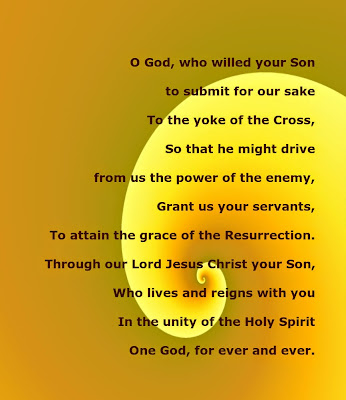Lectionary Year B Readings“I am troubled now. Yet what should I say?
‘Father, save me from this hour’?
But it was for this purpose that I came to this hour.
Father, glorify your name.”
John the Evangelist recalls only a brief moment when Jesus suffered any human hesitation as he approached the hour of his death. The synoptic gospels -- Mathew, Mark, and Luke -- give us more detailed accounts of the Lord's Agony in the Garden. He fell to the ground at the thought of what was about to happen; he sweated blood as he realized he would be dead by this time tomorrow.
But Saint John's Jesus reflects serene, presidential confidence from his first appearance in the Jordan River through his passion and death, and into his Easter appearances. In today's gospel, as the shadow of anxiety passes over the Lord, he immediately settles his soul with the prayer he has taught us, "Hallowed be thy name." It's virtually the same as "Glorify thy name."
His mission and ours is to give glory to God. From the moment God spoke to Abraham, eighteen centuries before Gabriel spoke to Mary, the mission of God's people has been to glorify God's name. Other people may know something about God. The Greek philosophers, for instance, supposed there should be a supreme being; but they had no name since he never spoke to them or revealed his name to them.
Our hallowing of God’s name, in obedience to the Lord's Prayer, begins with our reverence for the word God; and continues with our straightforward, direct language. Christians have no need to swear, as Jesus taught us:
...you have heard that it was said to your ancestors, ‘Do not take a false oath, but make good to the Lord all that you vow. But I say…. Let your ‘Yes’ mean ‘Yes,’ and your ‘No’ mean ‘No.’ Anything more is from the evil one.
Our hallowing the name of God the Father, the holy name of Jesus his son, and the Holy Spirit goes beyond not abusing the words. As God's holy people we bless God’s name when we speak of the wonders God has done for us. We are blessed in so many ways, and we must practice that attitude of gratitude. There are a billion obvious things for which we thank God from our birth – especially because of the parents who welcomed and did not abort us. To our food, shelter, security, education and opportunities And our health – such as it is. Everyone who has ever visited or stayed in a hospital knows there’s someone worse off than me. We thank God for our health, our breathing, and our being human.
We also remember the miracles when he healed us from the hurts we’ve suffered – especially those things that have been done to us. They are manifold, ranging from unintended insults to the cruelest, most deliberate crimes. By the Grace of God, and because we obey him, we learn to let them go. No regrets, no resentments, God delivered me from that place, that hurt, those people, and I have no need to go back. Praise God for that!
We hallow God's name by our cheerful generosity to others. If we are not generous, if our behavior is uncivil; our attitudes, cynical; and our thoughts, self-absorbed, then we dishonor God’s name. For the world is watching, and they know we are God’s people and are told to be holy as he is holy.
During Lent we approach the Sacrament of Penance to celebrate God’s mercy. The confession of our sins also glorifies God’s name. Like our fathers and mothers from ancient times, we remember and own their sins and ours; and that the Lord persistently, consistently, repeatedly forgives us for pretty much the same sins time after time after time.
Our life stories must become gospel stories, like the story of Jesus’s passion, death, and resurrection. If our gospels are different from his, it’s only in that they include the sins we have committed, while he is without sin.
In today’s gospel, Jesus reminds us, “It was for this purpose that I came to this hour.” He must glorify God’s name by his passion and death. He would betray his mission if he blamed anyone for his death; he would not save us if he condemned the Jews, or the Romans, or anyone else for what happened that day; as He said,
This is why the Father loves me, because I lay down my life in order to take it up again. No one takes it from me, but I lay it down on my own. I have power to lay it down, and power to take it up again.
Every time we say “forgive us our sins,” we admit to anyone in earshot that we have sinned, and thereby we Glorify the God who stands with us in our guilt, shame, and remorse.
That prayer is a sure sign of God’s mercy. It shows that the Holy Spirit still lives in our hearts; he still calls us together; his words still find utterance on our tongues, and God’s Holy Name is still glorified in us.
















